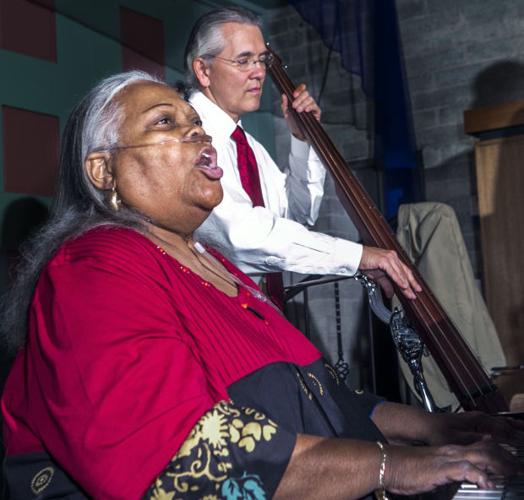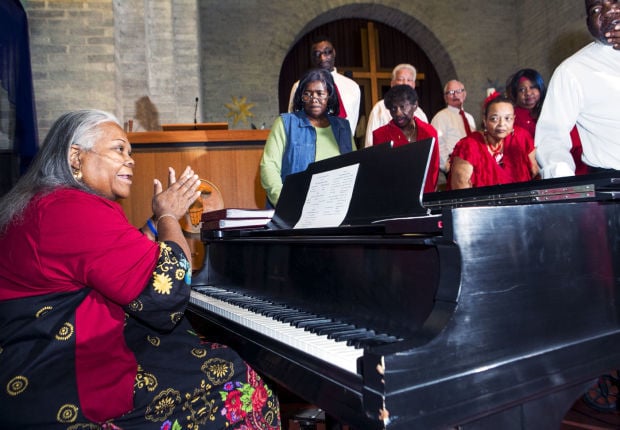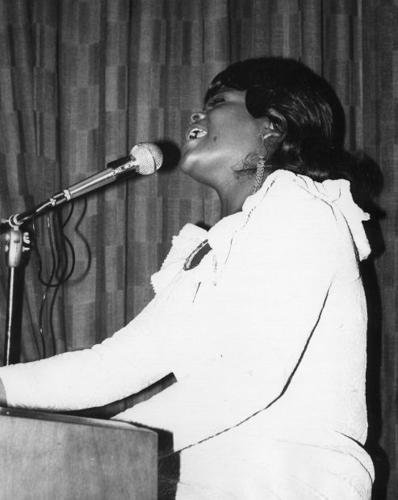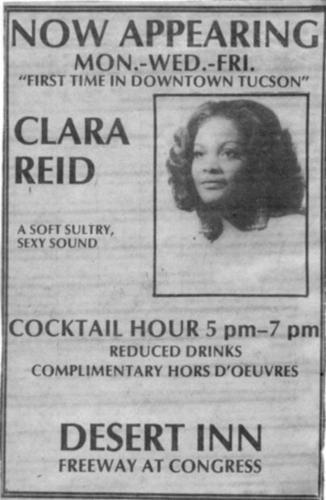When Dorothy Clara Reid’s fingers fly over the piano keys, and her strong voice fills the sanctuary at Southside Presbyterian Church, she feels wonderful.
In those moments, she forgets the oxygen tank resting beside her wheelchair or walker. Her voice swells to lead the church choir as it practices first for Sunday services and then for its upcoming Christmas concert.
“Oh magnify the Lord with me; let us exalt His name together,” she sings. The choir follows along.
Reid, 71, has led worship services as the church’s music director for about 20 years. She lives for the gospel music that tugs a stoic congregation to its feet to dance and clap. In 1999, teaching a music theory class inspired Reid to start the Tucson Arizona Mass Choir, which unites singers from Tucson’s different churches and denominations. She calls it a “great choir for God.”
At its peak, that choir had about 80 volunteers from almost 30 churches, she estimated. These days, Reid leads about 40 choir members in the mass choir and roughly 15 in the church ensemble.
“I can walk into church feeling terrible, but for that hour or two hours, I’m OK,” Reid said. “Then, I struggle to get out of the chair and get to the car.”
For about five years, Reid’s health has deteriorated. She lists the problems: chronic obstructive pulmonary disease, congestive heart failure, kidney disease, high blood pressure, diabetes and arthritis in her spine and knees.
She calls it a miracle that she can still sing. She finds peace in the praise.
Saturday’s Tucson Arizona Mass Choir concert started the choral Christmas season for her choirs. Health permitting, Reid’s piano will accompany Southside Presbyterian’s choir at its church concert next Sunday and again when it performs by invitation at St. Mark’s Presbyterian Church on Dec. 20.
An accomplished musician and composer, Reid can also play the organ, flute and alto and soprano saxophones. In college, she knew most of the woodwind instruments.
“She walks with this walker and just creeps up to the piano, but when she gets to that piano, you don’t even see her sickness because she is totally different,” said Mellernae Pennywell, who has worked with Reid for more than 20 years and has directed the mass choir. “She comes feeling so bad but still commits herself to play for us, and when we start rehearsing, she feels better. It’s kind of like a healing for her.”
God of her fathers
Reid started playing piano as a 5-year-old answer to the prayers of her grandfather, the pastor of First Baptist Church in Fayette, Alabama. His prayer for musical talent in one of his six children skipped a generation.
As the story goes, Reid got home from a graduation ceremony hosted at the church and played the processional, “God of Our Fathers,” from start to finish, she said.
And so her weekly music lessons began, including an 86-mile round trip with her aunt to Tuscaloosa, Alabama, when her talent to play by ear outpaced local instructors. She started playing for her grandfather’s church when she was 9.
“It’s just brought me so much joy down through the years,” Reid said. “Plus, if I practiced my music, I didn’t have to wash the dishes. I got out of quite a few chores.”
She also managed some sanctioned class-skipping in junior high and high school, playing for elementary school musicals, graduations and talent shows. It was a sweet setup.
“Until I got to college, and then I realized, ‘Oh man, what are you talking about?’ ” she said. “I knew absolutely no math, because they pulled me out of algebra class, and I was so glad — till I got to college.”
Civil Rights Movement
As a student studying at Alabama State University in Montgomery, Reid encountered the Civil Rights Movement, stuffing envelopes with information about mass meetings and marching once from Selma to Montgomery with Martin Luther King Jr.
“I was scared to death,” she said. “I remember singing, though. It seemed like the more scared we got, the louder we sang.”
She also integrated a Zales Jewelers near King’s Montgomery church. Originally hired for a job in the back, Reid pushed for more training and eventually took the position of a white woman who quit, miffed at Reid’s advancement. Her job required her to call customers about delinquent accounts. Many customers came in enraged to find an African American college student had made the call.
“I wasn’t supposed to have a job like that,” she said. “They couldn’t imagine a black person calling a white person about their bill.”
She persisted, taking the cussing and criticism in stride. In several months, the charge-off was zero, she said, and the president of Zales paid her a visit.
That’s how Reid does things. She pushes forward.
Clara Reid and the Swiss Movement
Before Reid began directing Tucson choirs, she played the bar and lounge circuit around the country, serenading audiences with her jazz and rhythm and blues group Clara Reid and the Swiss Movement. Local spots included the Red Slipper Lounge at the Holiday Inn and venues along Fourth Avenue.
She and her husband, who served in the U.S. Air Force, split after their 1983 move to Tucson.
Prior to that and in the period before the birth of her daughter, her only child, Reid relied on alcohol as her crutch and makeup as her mask. She remembers peering through peepholes and pretending she wasn’t home if her face was nude.
She played less in churches, but the faith of her grandfather nagged her conscience. And then it saved her.
“It gave me the strength to pull away when I needed it,” Reid said. “At my darkest hour, I was able to go back to my teachings and my faith and pull myself out of it. Well, I didn’t really pull myself out of it. God pulled me out, but it gave me the ability to pray and realize that I could come out of it if I wanted to.”
“I feel wonderful”
Southside Presbyterian Church discovered Reid during a gospel music workshop at Tucson Meet Yourself more than 20 years ago.
A church member stopped to listen. She pulled him in.
“You like gospel music?” Reid asked. A pause. “Aw, come on,” she said. So he did.
Later, Reid would play at the funeral of Southside’s prior music director, Rosie Johnson. At the time Reid was playing mostly for African American churches.
“I was asked to play for her funeral, and I was shocked when I went there,” Reid said of the diverse congregation. “These people sang like my people.”
The Rev. John Fife, the church’s pastor at the time, asked her to join them and lead the hymns and choir numbers in “the way only black gospel singers do.”
“I would like to tell you that the church grew in ministry and mission because of my brilliant sermons, but that would not be true,” he said. “It was because of the spirituality of worship, and right at the center of that is the music and leadership of Mrs. Reid.”
Reid can turn anyone into a singer.
“I can’t think of a word for her,” said Bill Captain, a tenor. “She’s wonderful. I’ve known Dorothy and sang with Dorothy for 26 years now, and Dorothy is the type of person that if you don’t think you got it, she’ll pull it out of you. In my case, I was terrified to get up in front of an audience, and Dorothy got me up there in front of the people and made me open my mouth.”
In love, Reid can “crack the whip” but is never slow to apologize, Captain said.
In his first solos, Captain, 85, remembers his knees shaking. Now, he is in charge of the Tucson Arizona Mass Choir tenors and sings with Reid at Southside Presbyterian as well. Music — and Reid’s subtle hints — also helped Captain kick alcoholism 25 years ago.
Both choirs sing songs that Reid has composed. She draws from her own experiences and biblical insights to write these anthems of faith.
“One day, I woke up after I had sobered up, and I noticed how bright and beautiful the sun was shining, and it just amazed me how clear and beautiful the day was,” she said. “I was in Florida, and I wrote a song called, ‘I Feel Wonderful.’ ”
Her voice takes on a rhythmic lilt as she recites the lyrics.
“ ‘I feel wonderful, so wonderful. I’ve been washed by the blood of the Lamb.’ It says, ‘My steps are lighter, the sun shines brighter.’ You know all this just came out of that revelation that day. You know, I was sober, and I could see, and it wasn’t through an alcoholic haze. It was beautiful.”
Moving forward
Today, Reid’s spirit continues to find joy in music, but her physical steps no longer have that lightness. Still, she refuses to “vegetate.”
About a year ago, friend Earline Perkins started spending most days at Reid’s home. The women met in chapel at Davis-Monthan Air Force Base decades ago and have sung together in choirs. Perkins, 86, is godmother to Reid’s daughter and granddaughter. They are still like sisters and fight like them, too, Perkins said.
“She needed somebody, and since I was retired, I was a free one,” Perkins said. “It’s been very hard on her, who was always a get-up-and-goer, but she would have done the same for me.”
And just as Reid continues on, so do her choirs.
“Part of what I think we have realized is to be faithful to her ministry is not to say we have to wait for Dorothy,” said Mark Rein’l-Bautista, 56, who has sung in both of Reid’s choirs with his wife, Sally, for about 10 years. “We have to pay attention to all she taught us and have the courage and belief in ourselves to carry on that ministry even though we want her to lead us.”
When Reid leads, she moves, head bobbing to the music as her fingers pound out a punchy staccato or float over a graceful legato. Pennywell can tell when the mass choir is singing well because Reid “will just lean back on the piano and start smiling.” If she is “giving the frown,” Pennywell knows they need to pick it up.
Some days, Reid can’t sing or play, and a church without a wheelchair ramp makes piano access nearly impossible. But if she can be there, she is there — and when she settles in at that piano and positions her fingers at the keys, joy abounds.
“I might be so depressed and so tired, especially now that my health is so bad. But that time that I spend in church, everything is lifted. I’m a different person,” she said, sighing to recall the weight that crashes back at ‘Amen.’
“But for that hour, it’s wonderful. I don’t hurt anymore. So many people come by the piano and express that same feeling, so I say, ‘Well, I must be doing something right.’ This is really what God wants me to do, so I feel happy to do it.”







